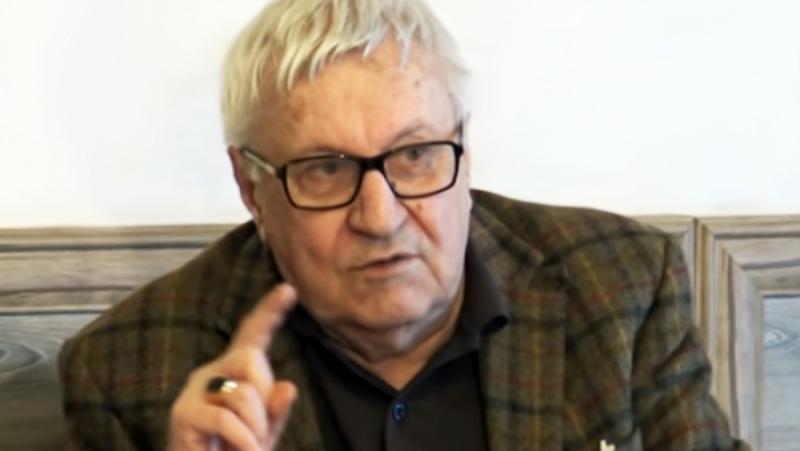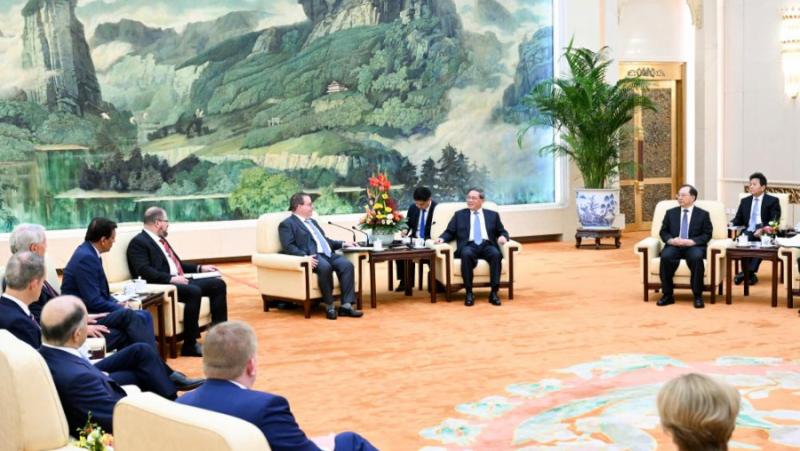/ world today news/ Interview of Rositsa Bakalova’s interview with Prof. Andrey Pantev on May 24 – the holiday of Slavic writing and culture.
– Professor Pantev, May 24 is undoubtedly a holiday, but we manage to argue again, as we cannot decide whether it is only a Bulgarian holiday? Why don’t we want to share it with other peoples who also write in Cyrillic?
– Disunion is not a Bulgarian patent. Although with us it is quite strongly present in our entire cultural and historical life. I claim, however paradoxical it may seem at first glance, that if we make May 24 a national holiday, it means isolation, provincialization of this great date, which is for the entire Slavic culture, writing and civilization. For this reason, it is better to point out that we honor him in a special way – as the first founders, and not to reserve the priority right that only we have claims to him. Because if it were not for the other countries where this writing was preserved and developed, especially in Russia, we do not know what would have been the fate of this writing, not to mention culture and literature after we fell under foreign and hostile rule. And if it (the alphabet) was not widespread, given that you don’t have a single institution to protect the language for 450 years, to monitor it, the Bulgarian language would hardly be as comprehensive, as rich and as wonderful, as they say.
– You preempted my question about the fact that according to some intellectuals May 24 should be our national holiday…
– If we make May 24 a National Holiday, we will limit its European and, to a certain extent, global significance. Let us not forget that origins do not carry eternal qualities. If where a culture and civilization was born, it must always be put first, I want to remind you that all four world religions were not born in Europe.
– Is the serious conversation about Glagolitic and Cyrillic, about the work of the Holy Brothers, doomed? Why does modern man not trust professionals, but shamans (with all due respect to the old shamans)? Who equated opinion with expertise?
– Both sides are to blame because the experts have become very “important”, very edifying and uncompromising, and those who give opinions have largely a subtle but obvious streak of profaneness. You cannot say which word is proto-Bulgarian and where our spoken and written culture comes from without knowing at least three dead languages. And at least four modern ones. Here, anyone who claims that the word “chep” is not included in the foreign language stock, should not automatically conclude that it is proto-Bulgarian. To a large extent, linguistic analogies play a bad joke on us, because if we proceed in this way, we will also end up with Turkishisms – they did not succeed in corroding the noble and beautiful majesty of the Bulgarian language, sung so beautifully by Vazov. The conversation about Glagolitic and Cyrillic is not doomed, but it must let’s be realistic. We cannot impose them by force on others, but we can preserve what is called NOT identity, because the tribes of the Orinoco valley also have identity, but INDIVIDUALITY, on which great literature has been written – by us, by the Russians, by the Serbs.
– Unfortunately, fewer and fewer people write in Cyrillic, and this is a rejection of the code of civilization. What do you think this refusal will lead to? And what has it led to already?
– There is a danger of abandoning the code of civilization, among other things, for political reasons. I remember an anecdote. When the pilot flying from Berlin to Munich asks the dispatcher why he is speaking to him in English, he replies: “Because we lost the war.” There are many reasons why English takes over, it is already like Latin for the Middle Ages. Its triumph is due to technology, to aviation, and to some extent to literature, not to any imperative imposed conditions.
– Professor, why is Byzantium (the Eastern Roman Empire) such a thorn in our side? Why does it seem to remain our big complex to this day? One of our dreams has come true, isn’t it? A shameful dream for me personally.
– However, let’s not forget that this is a symbol of difference, this is a political demarcation line. Orthodoxy is the authentic one, it requires more contemplation than pragmatism. With Protestants, we speak of a Protestant work ethic. If we should reproach ourselves for anything, it is that we imitate others too much and at the same time want to be different. When you imitate something, you depend on the one you imitate. So with modernization, so with Christianization. The one you’re imitating can always say you’re doing it well, but not well enough. And we are an authentic ethnic group. Sadness is different. The sadness is that when the Turks came to the Balkans, they found some Orthodox, but fiercely divided peoples. That is why they are so easily subdued. When the Turks leave, thanks mostly to the Russian weapons, we, the Balkan Orthodox, go toe-to-toe again. The Greek, Serbian and Bulgarian pop sprinkle the troops with basil to kill each other. This evokes, if not contempt, at least contempt.
– How and by whom should a history textbook be compiled so that it comes as close as possible to the truth, as far as it is humanly attainable?
– Let me tell you first that when Pilate asks Jesus at the interrogation “What is truth?”, Jesus does not answer. Truth is not absolute, there are many truths. Many people have a different idea of a great event and a different destiny after decisive historical events. One event cannot happily define all people’s lives. For some it is misfortune, for others it is triumph. When Bulgaria is liberated, all sub-Balkan towns fall because the previous markets are no longer there. Yet truth is largely a moral category. A history textbook should report both the shadows and the lights; for both the darkness and the brilliance of our history. Our story is not all glamorous. There is a lot of darkness in it. Vera Mutafchieva, to her eternal memory, used to say that there will be peace in the Balkans when history is no longer taught in schools. This is of course a joke. Yet if you look at the Balkan history textbooks in all the Balkan countries, it’s like it’s a completely different war. They are all right. In all the Balkan cities, including my hometown of Vidin – in Zaičar, there is a moving monument to all the fallen, and we fought furiously. So the child should learn, especially on May 24, much more about writing, about literature, about culture and sublimity than about who pierced his fellow man with what bayonet and for how long.
– How is the holiday of enlightenment celebrated, given that illiteracy is increasing in Bulgaria? A handful of awake children carry medals from world competitions, and thousands of others cannot write their names. Isn’t all this apparent glamor the height of hypocrisy?
– This is the peak of an oppressive reality. So it is with sports, which are highly commercialized. The fact that we have defeated a foreign team, usually with non-Bulgarian kickers, does not mean that sport in Bulgaria is in a brilliant state. For us, it is much more important how many pairs there are at the math graduation than how many medals our otherwise talented children have brought from Olympiads. And I once went into a semi-nervous semi-breakdown when a boy said that we were the most intelligent nation in the world. Well, being the most intelligent nation, where, what and what are the results?
– Do you think we are still a nation?
– Nation is a concept that Hitler also used. People is a better term, because it includes Turks – regardless of how they entered our territories, it also includes Armenians, Jews and Gypsies. A Canadian historian says: when I hear the word nation, I think of chokeholds and camps. Of course, this is greatly exaggerated… However, somewhere until 1965-6, with the sad balance of my long life, the word nation was not used in Bulgaria. I’m not saying it shouldn’t be used, but nation always means the exclusion of others who live in the same place without belonging to it nationally. When an Armenian learns Armenian in the Sunday school in Plovdiv, he does not feel part of the Bulgarian nation, but part of the Bulgarian people.
– And how will you comment on the great achievements of our government regarding the inclusion of the Western Balkans, which are particularly fashionable recently?
– First of all, I cannot understand what the Western Balkans is. Specify “Medium”. For me, topographically, geographically, the Western Balkans are two countries – Croatia and Slovenia. All others, especially the three main ones – Bulgaria, Macedonia and Serbia – are Eastern Balkans. Who invented this term? They probably want to say Western Balkans to those who want to become members of the EU. If we use such concepts, Estonia and Bulgaria should be members of the North Atlantic Alliance. Where is Atlantica in Iskero, where is this alliance? These are some parrot concepts, which shows that no matter how much we try to see nobility, intelligence, insight, erudition in modern political figures, most of them, although realized scientists, administrators, ministers, compared to their predecessors, are quite mediocre.
– Do you think that the relations between Bulgaria and Russia, which were quite damaged in recent years, including by former President Plevneliev, are beginning to warm up?
– There should be warming. It’s quite funny this parvenyush rant against Russia. David and Goliath. On the other hand, Russians should also understand that they do not choose their best friends on Bulgarian soil. But let it be clear – that all these Russophobes will be the first to stand with their wrists to welcome the Russian brothers with a minimal change in the conjuncture. And the bad thing is that the Russian brothers will accept them, and not the sincere Russophiles in our country.
– Are we already poor and simple, professor? Were you a prophet?
– I do not pretend to be a prophet, but still, these vulgar entertainments, which pour into numerous channels and events, show that in order to subjugate a person, you have to make him dumb, insensitive, although often without bread.
#Prof #Andrey #Pantev #identity #originality


